Abstract
Optimal reactive power flow (ORPF) is of great importance for the electrical reliability and economic operation of modern power systems. The integration of distributed generations (DGs) and two-terminal high voltage direct current (HVDC) systems into electrical networks has further complicated the ORPF problem. Due to the high computational complexity of the ORPF problem, a powerful and robust optimization algorithm is required to solve it. This paper proposes a powerful metaheuristic algorithm namely fitness-distance balance-based adaptive gaining-sharing knowledge (FDBAGSK). In the performance evaluation, 39 IEEE CEC benchmark functions are used to compare FDBAGSK with the original AGSK algorithm. Moreover, the proposed algorithm is applied to perform the ORPF task in modified IEEE 30- and IEEE 57-bus test systems. The effectiveness of the FDBAGSK method was tested for the optimization of three non-convex objectives: active power loss, voltage deviation and voltage stability index. The ORPF results obtained from the FDBAGSK algorithm are compared with other optimization algorithms in the literature. Given that all results are together, it has been observed that FDBAGSK is an effective method that can be used in solving global optimization and constrained real-world engineering problems.




















Similar content being viewed by others
References
Abaci K, Yamaçli V (2017) Optimal reactive-power dispatch using differential search algorithm. Electr Eng 99(1):213–225
Nguyen TT, Vo DN (2020) Improved social spider optimization algorithm for optimal reactive power dispatch problem with different objectives. Neural Comput Appl 32(10):5919–5950
Yalçın E, Çam E, Taplamacıoğlu MC (2020) A new chaos and global competitive ranking-based symbiotic organisms search algorithm for solving reactive power dispatch problem with discrete and continuous control variable. Electr Eng 102(2):573–590
Ayan K, Kılıç U (2012) Artificial bee colony algorithm solution for optimal reactive power flow. Appl Soft Comput 12(5):1477–1482
Yalçın F, Arifoğlu U (2013) A new approach based on genetic algorithm for optimal reactive power flow solution in multi-terminal AC-DC systems. Przeglad Elektrotechniczny 89(3a):231–235
Moghadam A, Seifi AR (2014) Fuzzy-TLBO optimal reactive power control variables planning for energy loss minimization. Energy Convers Manage 77:208–215
Sulaiman MH, Mustaffa Z, Mohamed MR, Aliman O (2015) Using the gray wolf optimizer for solving optimal reactive power dispatch problem. Appl Soft Comput 32:286–292
Mehdinejad M, Mohammadi-Ivatloo B, Dadashzadeh-Bonab R, Zare K (2016) Solution of optimal reactive power dispatch of power systems using hybrid particle swarm optimization and imperialist competitive algorithms. Int J Electr Power Energy Syst 83:104–116
Lenin K, Reddy BR, Suryakalavathi M (2016) Hybrid Tabu search-simulated annealing method to solve optimal reactive power problem. Int J Electr Power Energy Syst 82:87–91
Mei RNS, Sulaiman MH, Mustaffa Z, Daniyal H (2017) Optimal reactive power dispatch solution by loss minimization using moth-flame optimization technique. Appl Soft Comput 59:210–222
Sakr WS, El-Sehiemy RA, Azmy AM (2017) Adaptive differential evolution algorithm for efficient reactive power management. Appl Soft Comput 53:336–351
ben oualid Medani, K., Sayah, S., & Bekrar, A. (2018) Whale optimization algorithm based optimal reactive power dispatch: a case study of the Algerian power system. Electric Power Syst Res 163:696–705
Shaheen MA, Yousri D, Fathy A, Hasanien HM, Alkuhayli A, Muyeen SM (2020) A novel application of improved marine predators algorithm and particle swarm optimization for solving the ORPD problem. Energies 13(21):5679
Fadel W, Kilic U, Ayan K (2021) Optimal reactive power flow of power systems with two-terminal HVDC and multi distributed generations using backtracking search algorithm. Int J Electrical Power Energy Syst, 127, 106667.
Radosavljević J (2018) Metaheuristic optimization in power engineering. Institution of Engineering and Technology
Naderi E, Narimani H, Pourakbari-Kasmaei M, Cerna FV, Marzband M, Lehtonen M (2021) State-of-the-art of optimal active and reactive power flow: a comprehensive review from various standpoints. Processes 9(8):1319
Wei Y, Zhou Y, Luo Q, Deng W (2021) Optimal reactive power dispatch using an improved slime mould algorithm. Energy Rep 7:8742–8759
Duman S, Li J, Wu L, Guvenc U (2019). Optimal power flow with stochastic wind power and FACTS devices: a modified hybrid PSOGSA with chaotic maps approach. Neural Comput Appl 1–30
Vidyasagar S, Vijayakumar K, Sattianadan D, Fernandez SG (2016) Optimal placement of DG based on voltage stability index and voltage deviation index. Indian J Sci Technol, 9(38)
Duman S, Li J, Wu L, Yorukeren N (2021) Symbiotic organisms search algorithm-based security-constrained AC–DC OPF regarding uncertainty of wind, PV and PEV systems. Soft Comput 1–38
Chaib AE, Bouchekara HREH, Mehasni R, Abido MA (2016) Optimal power flow with emission and non-smooth cost functions using backtracking search optimization algorithm. Int J Electr Power Energy Syst 81:64–77
Duman S (2018) A modified moth swarm algorithm based on an arithmetic crossover for constrained optimization and optimal power flow problems. IEEE Access 6:45394–45416
Pulluri H, Naresh R, Sharma V (2017) An enhanced self-adaptive differential evolution based solution methodology for multiobjective optimal power flow. Appl Soft Comput 54:229–245
Ayan K, Kılıç U (2016) Optimal power flow of two-terminal HVDC systems using backtracking search algorithm. Int J Electr Power Energy Syst 78:326–335
Kılıç U, Ayan K (2014) Optimal power flow solution of two-terminal HVDC systems using genetic algorithm. Electr Eng 96(1):65–77
Kılıç U, Ayan K (2013) Optimizing power flow of AC–DC power systems using artificial bee colony algorithm. Int J Electr Power Energy Syst 53:592–602
Tong H, Zhu Y, Pierezan J, Xu Y, dos Santos Coelho L (2021) Chaotic coyote optimization algorithm. J Ambient Intell Hum Comput 1–21
Salgotra R, Singh U, Saha S (2018) New cuckoo search algorithms with enhanced exploration and exploitation properties. Expert Syst Appl 95:384–420
Stanovov S, Akhmedova E (2019) Semenkin, selective pressure strategy in differential evolution: exploitation improvement in solving global optimization problems. Swarm Evol Comput 50:100463
Sörensen K (2015) Metaheuristics—the metaphor exposed. Int Trans Oper Res 22(1):3–18
Abd Elaziz M, Yousri D, Mirjalili S (2021) A hybrid Harris hawks-moth-flame optimization algorithm including fractional-order chaos maps and evolutionary population dynamics. Adv Eng Softw 154:102973
Dehkordi AA, Sadiq AS, Mirjalili S, Ghafoor KZ (2021) Nonlinear-based chaotic harris hawks optimizer: algorithm and internet of vehicles application. Appl Soft Comput 107574
Aras S, Gedikli E, Kahraman HT (2021) A novel stochastic fractal search algorithm with fitness-distance balance for global numerical optimization. Swarm Evol Comput 61:100821
Gupta S, Abderazek H, Yıldız BS, Yildiz AR, Mirjalili S, Sait SM (2021) Comparison of metaheuristic optimization algorithms for solving constrained mechanical design optimization problems. Exp Syst Appl 115351
Halim AH, Ismail I, Das S (2020). Performance assessment of the metaheuristic optimization algorithms: an exhaustive review. Artif Intell Rev, 1–87
Turkeš R, Sörensen K, Hvattum LM (2021) Meta-analysis of metaheuristics: quantifying the effect of adaptiveness in adaptive large neighborhood search. Eur J Oper Res 292(2):423–442
Kahraman HT, Aras S, Gedikli E (2020) Fitness-distance balance (FDB): a new selection method for meta-heuristic search algorithms. Knowl-Based Syst 190:105169
Bakir H, Guvenc U, Kahraman HT, Duman S (2022) Improved Lévy flight distribution algorithm with FDB-based guiding mechanism for AVR system optimal design. Comput Ind Eng 168:108032
Kahraman HT, Bakir H, Duman S, Katı M, Aras S, Guvenc U (2022) Dynamic FDB selection method and its application: modeling and optimizing of directional overcurrent relays coordination. Appl Intell 52(5):4873–4908
Mohamed AW, Hadi AA, Mohamed AK, Awad NH (2020) Evaluating the performance of adaptive GainingSharing knowledge based algorithm on CEC 2020 benchmark problems. In: 2020 IEEE congress on evolutionary computation (CEC), pp 1–8. IEEE.
Mohamed AW, Hadi AA, Mohamed AK (2019) Gaining-sharing knowledge based algorithm for solving optimization problems: a novel nature-inspired algorithm. Int J Mach Learn Cybernet, 1–29
Derrac J, García S, Molina D, Herrera F (2011) A practical tutorial on the use of nonparametric statistical tests as a methodology for comparing evolutionary and swarm intelligence algorithms, Swarm. Evol Comput 1:3–18
García S, Fernández A, Luengo J, Herrera F (2010) Advanced nonparametric tests for multiple comparisons in the design of experiments in computational intelligence and data mining: Experimental analysis of power. Inform Sci 180(10):2044–2064
Awad NH, Ali MZ, Liang JJ, Qu BY, Suganthan PN (2016) Problem definitions and evaluation criteria for the CEC 2017 special session and competition on single objective real-parameter numerical optimization.”, Technical Report, 2016
Yue CT, Price KV, Suganthan PN, Liang JJ, Ali MZ, Qu BY, Awad NH, Biswas PP (2019) Problem definitions and evaluation criteria for the CEC 2020 special session and competition on single objective bound constrained numerical optimization. Tech. Rep., Zhengzhou University and Nanyang Technological University, 2019
Liang JJ, Qu BY, Suganthan PN (2013) Problem definitions and evaluation criteria for the CEC 2014 special session and competition on single objective real-parameter numerical optimization. Zhengzhou University, Zhengzhou China and Technical Report, Nanyang Technological University, Singapore, Computational Intelligence Laboratory
MATPOWER http://www.pserc.cornell.edu/matpower/.
IEEE 30-bus test system data http://labs.ece.uw.edu/pstca/pf30/pg_tca30bus.htm
IEEE 57-bus test system data http://labs.ece.uw.edu/pstca/pf57/pg_tca57bus.htm
Taghavi R, Seifi A (2012) Optimal reactive power control in hybrid power systems. Electr Power Compon Syst 40(7):741–758
Kılıç U, Ayan K, Arifoğlu U (2014) Optimizing reactive power flow of HVDC systems using genetic algorithm. Int J Electr Power Energy Syst 55:1–12
Kılıç U, Ayan K (2016) Artificial bee colony algorithm based optimal reactive power flow of two-terminal HVDC systems. Turk J Electr Eng Comput Sci 24(3):1075–1090
Yusran Y (2014) Electrical network power quality improvement through distributed generation optimum placement based on breeder genetic algorithm method. In: The international on electrical engineering and informatics conference (MICEEI), Makassar, South Sulawesi, Indonesia; 2014. pp 26–30
Acknowledgements
Hüseyin Bakır would like to thank the support provided by Scientific and Technological Research Council of Turkey (TUBITAK) BIDEB 2211/A National PhD Scholarship Program under application number 1649B031806288.
Author information
Authors and Affiliations
Corresponding author
Additional information
Publisher's Note
Springer Nature remains neutral with regard to jurisdictional claims in published maps and institutional affiliations.
Rights and permissions
Springer Nature or its licensor (e.g. a society or other partner) holds exclusive rights to this article under a publishing agreement with the author(s) or other rightsholder(s); author self-archiving of the accepted manuscript version of this article is solely governed by the terms of such publishing agreement and applicable law.
About this article
Cite this article
Bakır, H., Duman, S., Guvenc, U. et al. Improved adaptive gaining-sharing knowledge algorithm with FDB-based guiding mechanism for optimization of optimal reactive power flow problem. Electr Eng 105, 3121–3160 (2023). https://doi.org/10.1007/s00202-023-01803-9
Received:
Accepted:
Published:
Issue Date:
DOI: https://doi.org/10.1007/s00202-023-01803-9




